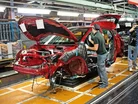UK car sales hit six-year low on Brexit and emissions uncertainty

The number of new cars sold in Britain last year fell to its lowest since 2013, as consumers held back from purchases amid increased restrictions on diesel vehicles and ongoing economic uncertainty in the run-up to Brexit.
Britain is Europe’s second-largest market for new vehicles, and Monday’s figures add to signs that households grew more cautious about their spending last year, despite low unemployment and rising wages, reports Reuters.
New car registrations dropped by 2% in 2019 to 2.31 million, according to provisional data from the Society of Motor Manufacturers and Traders (SMMT), the third annual fall since sales peaked at 2.69 million in 2016.
“Undoubtedly consumer confidence on big-ticket items is still very weak,” SMMT Chief Executive Mike Hawes said.
Car buyers’ reluctance to purchase diesel vehicles following Volkswagen’s emissions scandal, plus planned restrictions on older diesel vehicles going into city centres, also hurt demand.
Sales in December alone were up 4% from a year earlier, when stocks of some models were limited pending new emissions tests.
SEE ALSO:
Epicor survey finds UK manufacturing maintaining growth despite Brexit
SAS Automotive Systems: leading with a digital approach
INEOS Automotive’s Grenadier 4x4 to be built in Wales
Read the latest issue of Manufacturing Global here
Brexit remained the industry’s top concern, Hawes said, due to the risk of 10% tariffs on imports and exports of cars in 2021 if Prime Minister Boris Johnson cannot negotiate a post-Brexit trade deal with the European Union before then.
A tariff of this level would make a lot of car production in Britain uneconomic, and the risk of this has caused many manufacturers’ investment plans to stall, he added.
“There may be some light at the end of the tunnel, but it is a dull, flickering one at best,” he said.
Tougher environmental rules are another problem for the industry. After Brexit Britain is expected to stick to existing EU plans to fine car manufacturers whose vehicles emit more than 95 grams of carbon dioxide per kilometre travelled, which will take full effect in 2021.
Cars sold last year in Britain emitted 127.9 grams of carbon dioxide per kilometre on average, up 2.7% from a year earlier and above the 2018 EU average of 120.4 grams, largely due to Britons’ increasing preference for bigger cars.
Fewer sales of more efficient diesel cars, and a change to emission testing methods, also played a role.
Currently manufacturers can offset emissions from cars sold in Britain against those sold in other markets, such as Italy, where buyers favour smaller, more efficient vehicles. But after Brexit this is unlikely to be possible, Hawes said.
To reduce the extra cost for consumers and industry, Britain should expand subsidies for battery-powered electric cars, which made up under 2% of sales last year, he added.
- Nissan: Striving To Safeguard EV Manufacturing InterestsSustainability & ESG
- Be.EV Sheffield Charging Hub Signals EV Manufacturing GrowthSustainability & ESG
- How They Produce Multiple Drive-Types at Porsche LeipzigDigital Factory
- Scania Takes Vehicular Remanufacturing Beyond AftermarketSustainability & ESG

